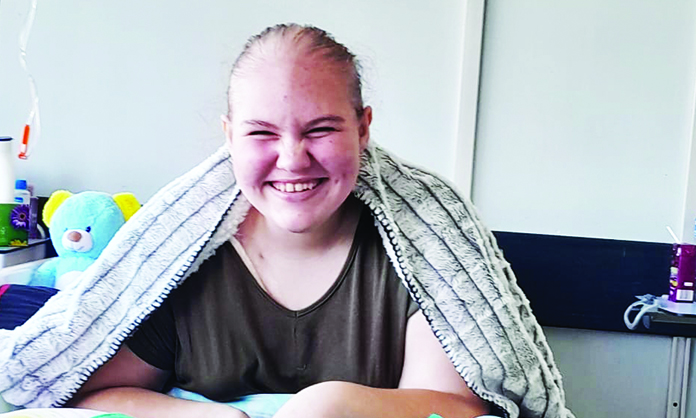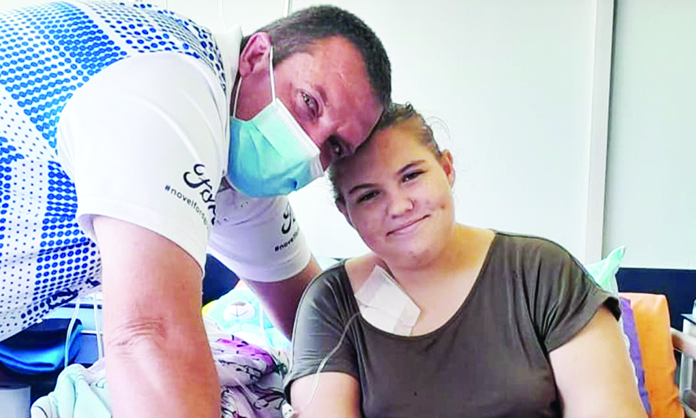. . . mother shares experience of daughter’s diagnosis
Some days are better than others.
“If you carry the load well, it isn’t that heavy, and with a good support system by your side, it’s just a question of faith.”
These were the words of Charmaine van Wyk (42) from Grootfontein, whose daughter, Cha’rissa van Wyk (14), has been diagnosed with cancer twice.
Cha’rissa was diagnosed with blood cancer at the age of three, and with bone marrow cancer (acute myeloid leukemia) last year. Childhood acute myeloid leukemia is a type of cancer in which the bone marrow produces a large number of abnormal blood cells.
Leukemia and other diseases of the blood and bone marrow may affect red blood cells, white blood cells, and platelets.
Other myeloid diseases can affect the blood and bone marrow.
Van Wyk says the first time her daughter was diagnosed, access to treatment was easier at a local state hospital.
This is, however, not the case this time around. “It is difficult to cope. We don’t have medical aid and there is treatment my daughter has to receive that the state hospitals in Namibia do not have,” Van Wyk says. “This time there is a lot we had to finance ourselves. The state does not provide the specific medication she needs. “A certain amount of chemotherapy is required per patient. Since she was diagnosed at an early stage of her life, all her chemo sessions have reached the limit,” she says.
The medication prescribed for Cha’rissa has not been approved by the Namibian health system yet, and is only available in South Africa, Van Wyk says.
This medication is needed on a monthly basis to keep cancerous cells from reoccurring in her daughter’s body, she says.
Cha’rissa, who is currently being home-schooled, was admitted at Windhoek Central Hospital last May, and has been in isolation for four months due to the type of chemotherapy she was receiving. Only her mother was allowed to see her.
“When her blood count was looking better, her father and siblings were also allowed to visit her,” Van Wyk says.
She says her daughter was discharged last August and spent two weeks at Chica House. Cha’rissa is currently in remission and in need of a bone marrow transplant, which is estimated to cost N$5 million.
The transplant can only be done in South Africa, Van Wyk says.

The family relies on public donations, funds from the Cancer Association of Namibia (CAN), and is working on events to raise funds for Cha’rissa’s treatment.
Van Wyk says the situation is financially draining, causing the family to spend lots of time apart.
She says parents should look out for persistent signs of illness in their children, such as headaches and fatigue.
If your child has been diagnosed with cancer, the whole family should see a psychologist, she says.
Van Wyk is urging the nation to donate blood as it helps cancer patients in need of blood transfusions.
LOOK OUT FOR SYMPTOMS
Dr Chatty Lisoma, a medical officer in the Ministry of Health and Social Services’ cancer prevention programme, says leukemia is cancer of the white blood cells, which is produced in the bone marrow.
Namibia last week joined the rest of the world in observing International Childhood Cancer Day, which is observed on 15 February annually.
Cancer Association of Namibia (CAN) chief executive Rolf Hansen has called on the nation to stand together to better understand the signs and symptoms to look out for, and to help children fight cancer.
Raising awareness, notably in countries with many competing public health needs, is indispensable in promoting early diagnosis and access to adapted treatment, he says.
The Namibian reported in October 2022 that 900 children were battling cancer in Namibia, and that about 280 children are diagnosed with leukemia, eye cancer, skin cancer, brain cancer and bone cancer annually.
Bone cancer is said to be the most challenging, yet common, cancer in children.
Each year, more than 200 000 children worldwide are diagnosed with cancer, according to statistics provided by CAN.
Stay informed with The Namibian – your source for credible journalism. Get in-depth reporting and opinions for
only N$85 a month. Invest in journalism, invest in democracy –
Subscribe Now!






